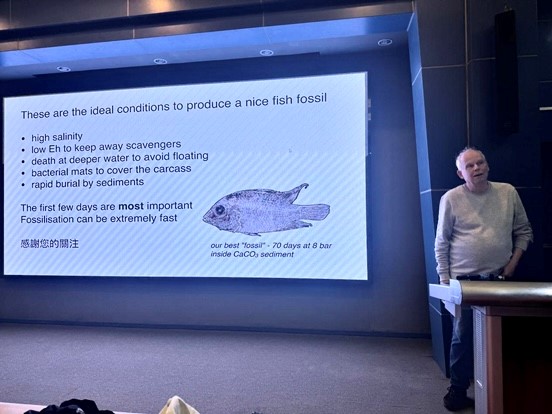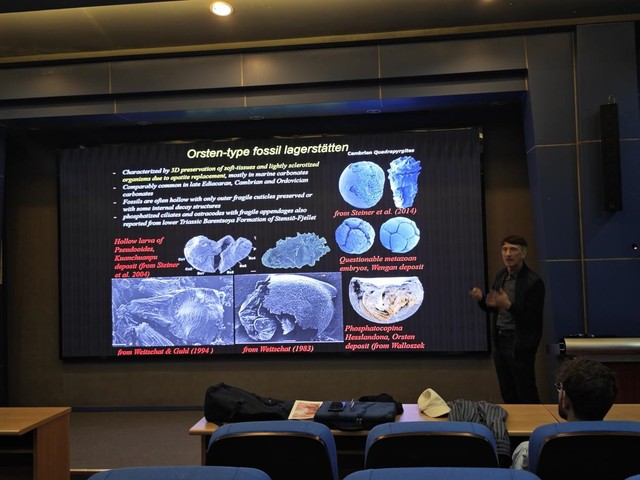From March 26 to 29, Professor Chris Ballhaus from the University of Bonn and Professor Michael Steiner from Freie Universität Berlin visited the State Key Laboratory of Marine Geology for academic exchange, at the invitation of Associate Professor Simon Hohl.
Professor Chris Ballhaus at the University of Bonn, currently a visiting professor at the Institute of Geochemistry, Chinese Academy of Sciences, is an internationally renowned expert in experimental petrology. He is known for his pioneering work on high-pressure and high-temperature experimental petrology. He has published extensively in top-tier journals such as Nature, Science, Earth and Planetary Science Letters (EPSL), Journal of Petrology, and Geochimica et Cosmochimica Acta (GCA), with over 10,000 citations.
Professor Michael Steiner, a paleontologist at Freie Universität Berlin and full-time professor at Shandong University of Science and Technology since 2022, is a leading scholar in Cambrian fauna, chemostratigraphy, and invertebrate taxonomy. He has authored over 100 papers in journals such as Nature, Nature Communications, and Geology. His research has significantly enhanced our understanding of the interactions between fossilized biota, microbial communities, and their environments, and has contributed to deeper insights into the coupling of paleoceanography, paleogeography, and paleoenvironments.
On the morning of March 27, Professors Ballhaus and Steiner delivered academic lectures to the faculty and students of the laboratory. Professor Ballhaus presented a talk titled “Experimental Fossilization of Fish”, showcasing controlled laboratory fossilization experiments and their implications for paleontological interpretations. While Professor Steiner’s lecture was entitled “Preservation of Brains in Marine Fossils: Facts or Artifacts?”, explored the preservation potential of delicate soft tissues in fossil records and its implications for interpreting early animal evolution.

Fossils are invaluable archives in the Earth sciences. In his presentation, Professor Ballhaus shared his latest findings on the physicochemical mechanisms behind fish fossilization. He introduced a series of fossilization experiments conducted at 25°C, where critical parameters such as water pressure, salinity, pH, redox potential (Eh), and sedimentation rate were carefully controlled. His findings emphasize the importance of the first few hours postmortem for fossil formation, with the best-preserved experimental fossils forming within 80 days. This research not only advances our understanding of fossilization processes but also provides important theoretical support for marine geology and related fields.

Fossils also offer key insights into the history of life. Professor Steiner’s lecture focused on the preservation of brains, neural tissues, and cardiovascular structures in marine fossils. Despite experimental taphonomy suggesting that such soft tissues decay rapidly, exceptionally well-preserved soft tissues have been found in Precambrian-Cambrian and Mesozoic strata in China. These discoveries offer novel perspectives on soft tissue preservation, yielding critical clues for reconstructing the morphology of early animal life.
The visit of Professors Chris Ballhaus and Michael Steiner represents a meaningful step toward strengthening academic exchange and collaboration between the State Key Laboratory of Marine Geology and leading international scholars in experimental petrology and paleoenvironmental studies. Their engagement not only deepens research on fossil preservation and experimental geoscience but also enhances the laboratory’s global academic presence and fosters broader cooperation with world-class research institutions.
Written by: Xinran Li


